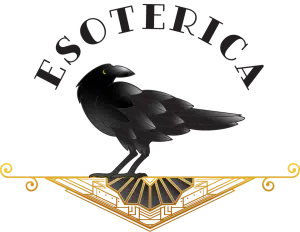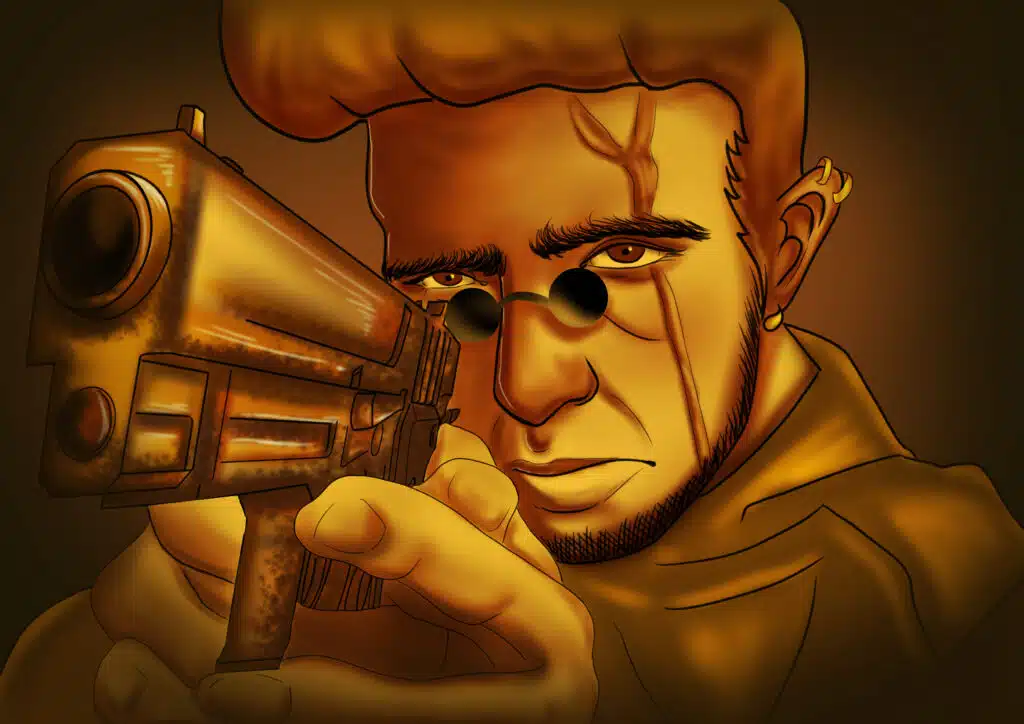By T.J. Seefeldt
The man had a job to do. He just couldn’t remember exactly what it was.
He looked up from the bed in the unfamiliar room, then started to get up. Shake the cobwebs off, he thought. But they wouldn’t shake.
He swung his legs off of the bed but crashed into a wall.
“Damn.”
He swung the other way and found the floor. But he couldn’t get his bearings. It was like somebody had smeared Vaseline over his right eye. And the left eye wasn’t up to doing the job for both. He had a pin-hole line of vision and even that was fuzzy.
This would be bad for anybody. But it was especially bad for the man. He was supposed to shoot somebody today.
He knew that much. Beyond that? He wasn’t crystal clear on where he was. He couldn’t even get his target’s name to take hold. Or his own, for that matter. But he was certain he was close to his prey. And he knew that he had half of his fee and to get the rest, the man needed to be dead by day’s end.
The gunman stared into his fog and wondered if he was badly hung over.
No way.
He never drank before a job.
Of this, he was certain.
This was a different feeling. It was like he was living outside of his body and mind somehow. As though he was only partially present, with a piece of him watching from someplace else. Not as if he was outside of his body, more like outside of the place his body was.
“Get a grip, man,” he thought he said out loud.
He wasn’t sure, though, because all he could hear was a ringing in his ears. This went along with a headache the likes of which he had never experienced. It wasn’t throbbing or pounding. It was more like pain was flowing into his head like lava from a volcano. It filled every space in his brain and seemed to be forcing his scull to open slowly but persistently wider.
The only relieve the man could think of was to dunk his head into cold water.
He started to lift himself off of the bed but he had no sensation in his right hand or leg and without their cooperation, the man tumbled to the floor, landing flat on his face.
He tried to push himself up, but he flopped down again.
“Son-of-a-bitch.”
He rolled on to his back, closed his eyes and tried to think.
This wasn’t easy in his current state, though.
His thoughts — the thoughts — weren’t so much confused as separate. Part of his mind was trying to figure out the practical solutions to his dilemma while the other thoughts were with him in what seemed another dimension attempting to puzzle together the big picture. But both spaces fought with each other for attention so answers struggled to take shape.
Don’t try to think, the man decided, just try to do.
He took a hazy peek at his body. His hands and legs were there, all right. They just wouldn’t do what he told them to. He realized the trouble was focused on his right side.
He tried again to get up, this time treating his limbs like a machine he wasn’t quite sure how to operate. He battled the competing parts of his mind, focused the best he could on his wayward limbs and willed them to move. He felt nothing, but it worked. Sort of. He coaxed his body to rise, without feeling, almost like a marionette without strings. He fell twice but eventually he was back on top of the bed.
He sat for a minute to catch his breath.
“How am I gonna shoot like this?” he asked the competing parts of himself. “Hell, I better remember where to get my money after he’s dead. And I better figure out who ‘he’ is.”
The man had slept in his pants and boots. And after a lot of banging around — as he tried to perfect his new method of willing his limbs to move — he found a shirt hanging on a chair. He fought his body and managed to get it on. He spotted his gun and belt and made a note of where they were carefully hung. He let them be, hoped he would remember the spot later, fumbled around some more until he found the door and headed out. To where? He had no idea. The man just knew he needed to move.
The trip down the steps, once he found them, was more trip than step. By the time he got to the main floor lobby the desk clerk was running toward him.
“Mr. Potts! Are you Ok?”
He stood a moment to drink this in. Mr. Potts? Right, Cleveland Potts, that was his name, he thought. Why wasn’t this immediately clear to him?
“Ya, sure I am. Can’t seem to shake the cobwebs out this morning,” Cleveland said.
From what he could see, the desk clerk was rattled.
“You sure it’s just cobwebs, Mr. Potts? You seem, ‘er, off. And you damn near broke your neck on the stairs.”
“I’ll be fine.”
“You should go see the doctor.”
“I don’t see doctors.”
“No offence, Mr. Potts, but your voice? It sounds funny. Like you’re slurring but not really. Worse, like you’re having trouble getting the words out. Not just getting them out, but not knowing which words to get out. You don’t seem focused, clear. Or steady. The doctor might be able to give you some medicine that will help.”
When it came to doctors, Cleveland had a blind spot. He wasn’t sure how he knew this, he just did. He had a job to do, though, and money to collect. There was no hope of either in his current state, he reasoned. Maybe some medicine would help.
“Where is he?”
“I’ll get the boy to take you.”
Cleveland couldn’t protest. He’d barely made it down the stairs and he sure as hell couldn’t find this doc’s place alone. He’d see him, get some medicine, wait for whatever this was to clear up, then go finish his job.
A younger version of the desk clerk showed up.
“I’m supposed to take you to Doc Adams.”
Cleveland wasn’t sure how long it took them to stumble to the doctor’s office, but he had to hang on to the kid’s shoulder the whole way. The doctor was a little older than him, late 40s. Cleveland rattled him. That was even clear through a wonky eye.
“Mr. Potts, did you hear what I said? How long have you been feeling this way?”
“What? Oh, since I woke up, I guess.”
“And you were fine yesterday? Do you remember yesterday?”
“Of course, I remember yesterday. I checked in to the hotel yesterday.”
“Good. Where’d you come from? Coalbanks?”
“No. Ah…”
“Do you know where you are now? What town?”
“Of course, ah…”
“You’re in Calgary, Mr. Potts.”
As he was answering — or not answering — the docs questions, Cleveland became aware of being unaware. Past, present, it was all a fog. Snippets here, glimpses there.
“Mr. Potts? Mr. Potts?” it was the doc again.
“Ya, Dr….”
“Adams. Dr. Levis Adams.”
I know that name, thought Cleveland. He was frustrated that he couldn’t place where from, but pleased that his memory was firing on at least some cylinders.
“Mr. Potts, this is serious,” said the doctor, whose name was fading out from Cleveland’s recall again. “I believe you’ve had an attack to your brain. Something called apoplexy, or a stroke, some call it.”
Cleveland just stared, half listening, half trying to place the doctor’s name.
Adams when on: “Apoplexy is rare. I’ve never seen it myself. You need to rest. I need to figure out what to do. I’m going to get the boy to take you back to the hotel. I’ll come see you later.”
“I can’t wait around, Dr….”
“Adams. Levis Adams.”
Click. Another cylinder fired into gear and Cleveland’s noodle made the connection.
“OK doc. I’ll be waiting.”
The kid got Cleveland back to his room. When he’d left, Cleveland shook his head slowly then laughed.
“Well, that’s one problem solved. When what’s his name get’s here, I’ll shoot him then figure out where to get my money.”
Cleveland wasn’t sure exactly what twigged his mind that Adams was his job. He didn’t care. If he could remember he was supposed to kill the doctor, he figured that he’d eventually remember where to get his money.
But there were a couple of problems. He had to figure out if he could shoot with his numbed right hand or if he should try the left. The bigger deal, though, was making out this doc with his hazy eyes.
Cleveland found his Colt Peacemaker, sat down on the bed and tried both hands out, aiming at the door. He settled on two hands, with his left on the grip. Aiming would be tough, but he’d be at close range. It’d work. Eventually.
Cleveland waited, sitting on his bed with the Colt in his hands. There was a lot of waiting in his work. The trick was not to think too much. A trick that was harder to pull off with a frazzled brain.
Was it right to kill a man who was trying to help you? Cleveland reasoned that it would be worse not to finish a job. Unprofessional.
There was a knock on the door and Dr. Adams came in without waiting to be told.
“Mr. Potts. I’ve read everything I have on apoplexy. Fascinating,” he said.
“These ‘strokes’ were first recognized 2,400 years ago, but it’s still pretty much a mystery. I’m sending a telegraph to a doctor out east asking for advice. Meantime, you need to rest.”
“Is there medicine you can give me?”
“No. We have to wait until I get a response to my telegraph. Do you understand?”
“Sure doc.”
Cleveland raised the pistol and trained it best that he could on the doctor. He might be messed up, but most folks didn’t argue when facing steel, no matter who was holding it.
“I was afraid this is what brought you to town,” said the doc. “I just need a few days and I can square things with your boss.”
“I don’t have a boss. When I’m called in, the time to talk is through.”
“But I’m trying to help you, Mr. Potts. You need help.”
“It’ll work out or it won’t. I’ve got a job to do.”
Cleveland pulled the trigger. It was a bad shot, but it looked like he got a piece. It took four more to get the job done.
Embarrassing.
But he didn’t get a bonus for style points.
Cleveland was halfway down the stairs when the hotel clerk’s boy was on him. The kid fired three bullets into the gunman while Cleveland struggle to focus.
The kid and his father kept Cleveland’s condition to themselves. The kid got a nice reward for killing the killer and kept the outlaw’s gun, which his great grandson sold years later for a small fortune.
The kid was shot dead just five years after killing the gunman. He’d bragged about his story once too many times to a crowd at a tavern that included a man who’d once worked with Cleveland.
T.J. is an ex-newspaper reporter based in Sherwood Park, Alberta, who lost the ability to read and write after suffering a stroke. With the help of his wife and daughters, inspired rehab pros and some cool tech tools, he’s reading and writing again. “Better than ever, weirdly enough,” he said.

